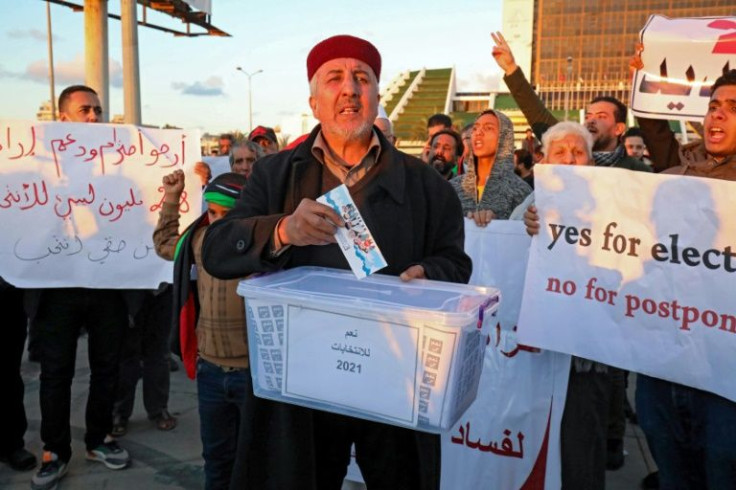Libya Urged To Reschedule Presidential Vote 'Swiftly'
The US and four European powers on Friday urged war-torn Libya to quickly set a new date for delayed presidential elections.
In a joint statement, they urged the North African country's leaders to "swiftly" name a new date and issue the final list of presidential candidates, which had been a key point of contention in the run-up to the polls that were set for Friday.
"We call on the relevant Libyan authorities to respect the aspirations of the Libyan people for prompt elections," said Britain, France, Germany, Italy and the United States.
The authorities overseeing the country's first-ever presidential election said earlier this week that holding it on Friday as scheduled would be "impossible".
The vote was intended to mark a fresh start for the oil-rich country, a year after a landmark ceasefire and more than a decade after its 2011 revolt that toppled and killed dictator Moamer Kadhafi.
But speculation of a delay had been mounting for weeks. There were bitter disputes over the vote's legal basis, the powers of the winner and the candidacies of several deeply divisive figures.
The country's electoral commission has suggested rescheduling the vote to January 24, but it remains to be seen whether agreement can be reached among divided institutions.
Libya's parliament is to meet on Monday to debate a new timeline.

Another key issue will be the mandate of the current interim government, which was meant to end Friday with the elections.
In their statement, the five powers insisted that "transfer of power from the current interim executive authority to the new executive authority shall take place following the announcement of the results" of polls when they happen.
In a later tweet, the UK embassy in Tripoli said London "continues to recognise the #Government_of_National_Unity as the authority tasked with leading #Libya to #elections and does not endorse the establishment of parallel governments or institutions."
The Tripoli-based unity administration is headed by Abdulhamid Dbeibah, a tycoon and presidential candidate. Analysts have suggested that his rivals may wish to exploit the delay in order to put him out of the picture.
The presidential ballot was intended to go hand-in-hand with parliamentary polls as part of a United Nations-led peace process, yet UN special envoy Jan Kubis resigned just weeks before the ballot.
One contentious issue was a presidential elections law controversially passed by parliamentary speaker Aguila Saleh and endorsed by Kubis. Critics say it bypassed due process and favoured a run by eastern military chief Khalifa Haftar.
Another candidate is Kadhafi's son Seif al-Islam -- a divisive symbol of the old regime wanted by the International Criminal Court over war crimes allegations.
Libya has seen a year of relative calm since the October 2020 ceasefire following a year-long offensive by Haftar's forces on Tripoli, with both sides backed by foreign states.
But the delay to elections has once again thrown the political process into doubt, and the potential for new fighting remains ever-present.
© Copyright AFP 2024. All rights reserved.





















